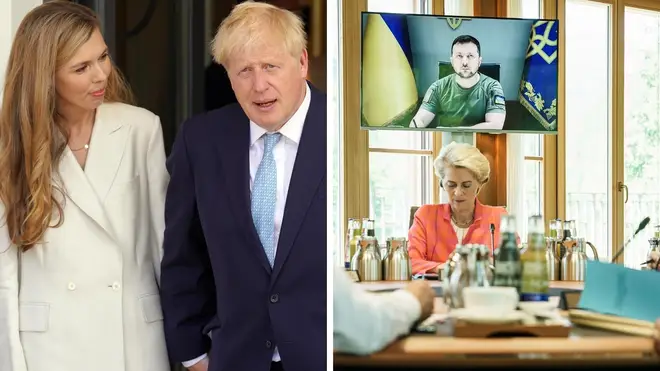
Nick Abbot 10pm - 12am
27 June 2022, 13:30

Boris Johnson has drawn a parallel between Russia's invasion of Ukraine and standing up to Nazi Germany.
Speaking to the media after Ukraine's President Zelenskyy addressed a G7 meeting, Mr Johnson said: "I think that sometimes the price of freedom is worth paying and, just remember, it took the democracies in the middle of the last century a long time to recognise that they have to resist tyranny and aggression.
“It was very expensive but what it bought in the end with the defeat of the dictators, particularly of Nazi Germany, it bought decades and decades of stability, a world order that relied on a rules based national system, and that is worth protecting, that is worth defending – that delivers long term prosperity.”
Mr Johnson said the military situation in Ukraine remains "very difficult" but that the Ukrainians are still fighting back against the Russian advance.
Read more: Charles charity faces probe after ‘unusual’ donation of bags of cash from Qatari sheikh
Read more: Barristers walk out of courts in strike over pay with over 1,000 cases affected each day

G7 has resolve and unity to support Ukraine, Johnson says
Speaking at the G7 summit in Germany, the Prime Minster said: "The situation in the east, in the south-east of the country remains very difficult, but the Ukrainians have shown that they have incredible ability to push back and change the military position."
Mr Johnson’s comments come after president Zelenskyy urged G7 leaders to “not lower the pressure” and keep up “heavy” punitive action on Russia.
He said sanctions should “continue to be strengthened” and called for more weapons to be sent to Ukraine,.
In a joint statement, the G7 leaders promised to support Ukraine "for as long as it takes".
They said: "We will continue to provide financial, humanitarian, military and diplomatic support and stand with Ukraine for as long as it takes.
"As we do so, we commit to demonstrate global responsibility and solidarity through working to address the international impacts of Russia's aggression, especially on the most vulnerable."

Zelensky speaks with G7 leaders as they prepare new aid for Ukraine
It also emerged today that NATO will significantly increase the number of forces on high alert to well over 300,000 from 40,000 as part of the biggest overhaul of the alliance's defences since the Cold War.
Jens Stoltenberg, the NATO secretary general, also confirmed that allies will expand troop deployments in NATO countries close to Russia.
In a further development, Group of Seven economic powers are set to announce an agreement to pursue a price cap on Russian oil, aiming to curb Moscow's energy revenues, a US official has said.
The move is part of a joint effort of support for Ukraine that includes raising tariffs on Russian goods and imposing new sanctions on hundreds of Russian officials and entities supporting the war.
Leaders were finalising the deal to seek a price cap during their three-day summit at Schloss Elmau in the German Alps.
The details of how a price cap would work, as well as its impact on the Russian economy, were to be resolved by the G7 finance ministers in the coming weeks and months.